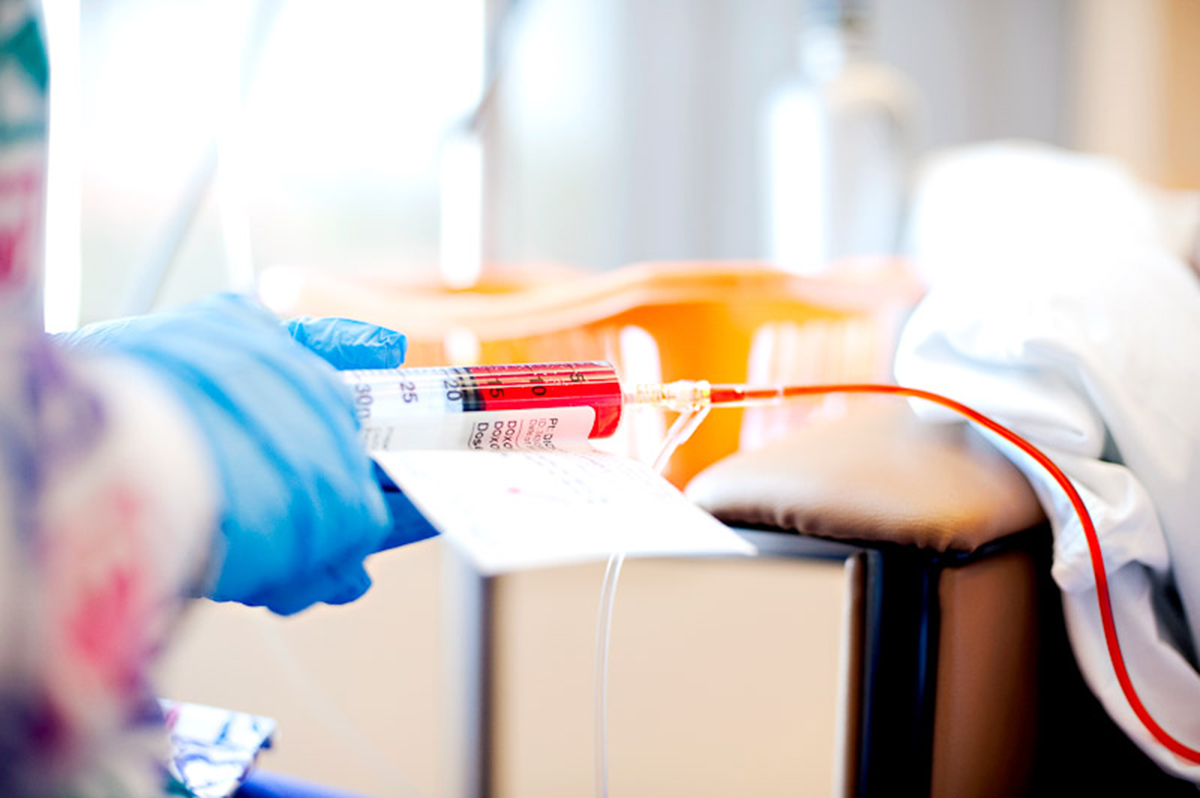Table of Contents
Q: How is chemotherapy administered and for how long?
Chemotherapy can be given to patients in various ways: through a vein (intravenously), by mouth (as a typical pill), with a shot (injection) or topically (by applying it to the skin). The method for administration will depend on the chemo drug that is most adequate for the type and stage of cancer, the goals of the treatment and the person’s response to the drug. In certain specific cases, it might even be injected into the spinal fluid that surrounds the spinal cord or brain (intrathecal or intraventricular injection).

The method of administration will also influence the place where patients are given treatment. Following the instructions of a doctor or nurse, it is possible to administer chemotherapy at home in pill form or using syringes and needles similar to those that patients with diabetes use, in case the drug has to be injected. In many cases, however, it is necessary to go to an outpatient clinic or to the hospital to receive treatment.
Chemotherapy regimens are typically scheduled in a cyclic manner. This means that patients receive treatment, followed by a period of rest, and then get treated again.
It is all very specific to each patient’s condition, but it generally consists of four to six cycles. As for each treatment’s duration, it also varies individually. Some treatments may take a short period of time to receive the drugs, while others may take hours.
Q: Chemotherapy is said to be a very aggressive type of treatment, with a number of side effects. When undergoing chemotherapy, what sort of noxious effects can I expect?
Cancer cells are not only the cells that divide rapidly. Healthy cells, like the cells that line the mouth and the intestine, cells in the bone marrow that produce blood cells and cells that make hair grow, also grow and divide quickly. Chemotherapeutic drugs cannot tell the difference between these absolutely normal cells and cancerous cells. This is why chemotherapy harms healthy cells resulting in side effects.
Some people experience a lot of side effects, while others suffer none at all. This, again, depends on the type and amount of chemo drugs that the person is receiving and on how their bodies react.
Some side effects may be temporary and merely annoying. Others, such as infection or a low white blood count, can be life-threatening.
See Also: Powerful Chemotherapy Drugs Appear Safe in Pregnancy, Study Finds
Q: Will I lose my hair during chemotherapy, and is there anything I can do to prevent it?
Hair loss, or alopecia, is a common side effect of many chemotherapy drugs because these drugs target rapidly dividing cells, which includes hair follicles. However, not all chemotherapy drugs cause hair loss, and the extent of hair loss can vary from person to person. Whether you'll lose your hair and to what degree depends on the specific drugs you receive.
Some patients use scalp cooling (cold caps) during treatment to reduce hair loss, but it's not guaranteed to work for everyone. Wigs, scarves, or hats are often used for cosmetic reasons.
Q: What are the chances that chemotherapy will work?
The chance of the chemotherapy curing your cancer depends on the type of cancer you have. With some types of cancer most people are cured by chemotherapy, while with other types of cancer fewer people are completely cured.
This chance should be thoroughly discussed by patients with their doctors, as no definitive answer exists.
- Early Breast Cancer Trialists’ Collaborative Group (2012) Comparison between different polychemotherapy regiments for early breast cancer: meta-analyses of long-term outcome among 100 000 women in 123 randomised trials. Lancet, 379, 432-444.
- Photo courtesy of Rhoda Baer by Wikimedia Commons : commons.wikimedia.org/wiki/File:Patient_receives_chemotherapy.jpg
- Photo courtesy of Stephen Dickter by Flickr : www.flickr.com/photos/sdickter/3563942566
- Photo courtesy of Ed and Eddie by Flickr : www.flickr.com/photos/edandeddie/12921492634
- www.mayoclinic.org/diseases-conditions/cancer/in-depth/cancer-treatment/art-20047246
- www.cancer.org/treatment/treatmentsandsideeffects/treatmenttypes/chemotherapy/understandingchemotherapyaguideforpatientsandfamilies/
- www.henryford.com/body.cfm?id=55929
- www.cancer.gov/cancertopics/coping/chemotherapy-and-you.pdf


Your thoughts on this